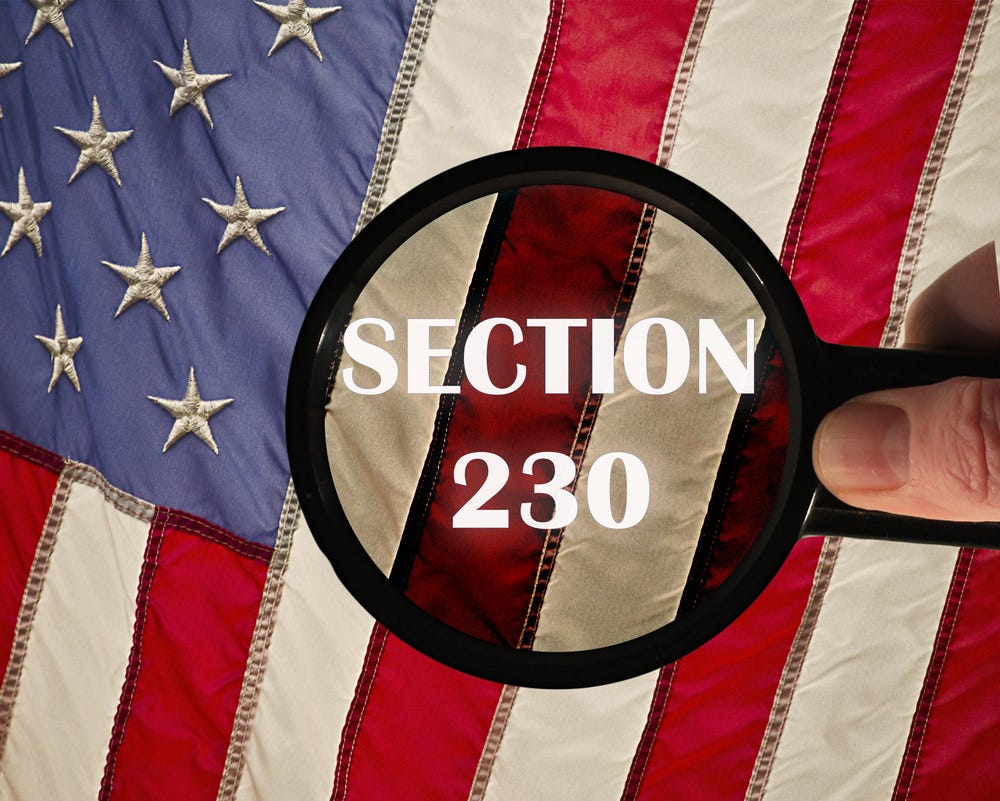E-Pluribus | October 19, 2021
Some thoughts on illiberalism from... Norman Mailer, what real antiracism can look like, and in praise of Section 230.
A round up of the latest and best writing and musings on the rise of illiberalism in the public discourse:
Lee Siegel: Liberal Pieties, Illiberal Consequences
Those resisting the tide of illiberalism in 2021 can benefit from those who faced similar forces in the past. Lee Siegel at City Journal says writer Norman Mailer was brutal in his treatment of those he saw as betraying liberalism. Siegel looks at Mailer’s book Armies of the Night and how today’s progressives’ myopic view of current social and political issues is nothing new.
Norman Mailer’s Armies of the Night… is a strange, wild book, not to everyone’s taste—Mailer’s grotesque caricature of the people who live in America’s small towns is obtuse—but what I find most admirable about it is that it exposes, again and again, liberal pieties that have illiberal consequences.
Mailer writes that the liberal intelligentsia inspired in him “the deepest detestation.” Loathing their hyper-rationalizing faith in overweening bureaucracies, he castigates their “overpsychologized loins” and describes them as “the natural managers of that future air-conditioned vault where the last of human life would still exist.” It was just such sterile faith in the technological reordering of humankind that, in Mailer’s eyes, had led America into the blind optimism of the Vietnam War.
“They were,” Mailer writes of liberal intellectuals, “servants of that social machine of the future in which all irrational human conflict would be resolved, all conflict of interest negotiated, and nature’s resonance condensed into frequencies which could comfortably phase nature in or out as you please.” (Siri: play the sound of a rainforest.) He continues: “They were brusque to the world of manners, they had built their hope of heaven on the binary system and the computer, 1 and 0, Yes and No—they had little to do therefore with the spectrum of grace in acceptance and refusal; if you did not do what they wished, you had simply denied them.” And over half a century later, if you do not do what they wish, they will simply cancel you. “Their enmity,” Mailer concludes, “could be venomous.”
Read it all.
Phillip W. Magness: School Choice’s Antiracist History
There is much talk of “antiracism” these days from progressives, but Phillip Magness writes at the Wall Street Journal that early advocates of school choice actually did more than talk. But just as they do today, teacher unions in the 1960s saw school choice as threatening, even if (or because?) it meant schools remained less integrated than they might otherwise be.
These critics have their history backward. As early as 1955, economists such as Friedman began touting vouchers as a strategy to expedite integration. Virginia’s segregationist hard-liners recognized the likely outcomes and began attacking school choice as an existential threat to their white-supremacist order.
The overlooked story of Virginia’s racist antivoucher movement traces its origins to Charlottesville’s Venable Elementary School in 1958. Facing court-ordered integration from an NAACP lawsuit, Venable closed its doors for the fall semester and transferred its white student body to a makeshift network of private classrooms.
Four months later, a pair of court rulings struck down the school-closure strategy. In the spring of 1959 anxious parents flooded into a PTA meeting at Venable to hear from John S. Battle Jr., the school board’s attorney in its fight against the NAACP. Battle said white schools could desegregate on paper, then use zoning and enrollment caps to block black students’ transfer applications.
[…]
If Virginia adopted tuition grants, Battle wrote in a letter to Gov. J. Lindsay Almond, the subsequent “departure of white pupils from their public schools will make integration much easier to accomplish.” Battle correctly predicted that the federal courts would soon require private schools to accept black students as a condition of state funding, leading to their integration as well. “I refuse to believe that we should allow a few negroes to run us out of our good white schools,” Battle concluded. The only path left for segregation was to tie it to “the most effective place; namely the pocketbook” of school funding.
Battle’s message resonated among public-education interests, which thought their funding would be imperiled by vouchers. An internal memo from a Charlottesville teachers group presented a plan for “containing integration.” The tuition-grant program, the memo said, attempts “to get as many pupils as possible so that integration will be as extensive as possible, thus making public schools unacceptable to as many people as possible.” Budget cuts would soon follow. The Virginia Education Association, the state teachers union, embraced the strategy and circulated a transcript of Battle’s remarks to every superintendent in the commonwealth.
Read it all here.
Charles C. W. Cooke: There’s Nothing Wrong with Section 230
Neither conservatives nor progressives have reached anything like a consensus amongst themselves on Section 230 of the Communications Decency Act and whether its immunity regarding third-party content for web platforms amounts to an infringement on free speech or a protection. Charles C. W. Cooke at National Review contends that objections to Section 230 are often wildly misguided and simply miss the point of what the provision actually does.
Echoing a common complaint, Hochman characterizes these rules as “a special, targeted set of protections that legislators saw fit to extend to one specific industry.” But the “one specific industry” here is not really “an industry,” so much as it is the entire Internet. Yes, Facebook is covered by the principles underpinning Section 230. So is the New York Times. So is Major League Baseball. So is Microsoft Azure. So is Spotify. And so is Emily’s Cat Blog. In reality, Section 230 isn’t “targeted” at all. Instead, it’s a categorical provision that sets in place a commonsensical principle: Websites can’t be held liable for words that they neither published themselves nor expressly permitted others to publish in their pages.
[…]
The moderation decisions that are made by Twitter and Facebook and National Review and Johnny’s Bar and Emily’s Cat Blog may, indeed, be stupid. But they are those sites’ bad decisions, not the U.S. government’s. “Deputize,” “outsource,” “induce” — these words all mean something concrete, and that something is not “to act according to one’s own ideological star.” Donald Trump, you will likely recall, was expelled from both Twitter and Facebook while he was the president of the United States. It would be an extremely strange form of deputization that led to that outcome, n’est-ce pas?
Read the whole thing.
Around Twitter
Below are excerpts of a thread from David Romps, the (now former) Director of the Berkeley Atmospheric Sciences Center at University of California Berkeley. His resignation is the latest fallout from the treatment of Dorian Abbot by the Massachusetts Institute of Technology that we highlighted here last week:
Tim Carney, Will Wilkinson and Robert Tracinski exchange some thoughts on cancel culture:
Click through for the whole thread by Glenn Greenwald about perceptions of media bias:
Finally, a closing thought from Conor Friedersdorf related (presumably) to the Dave Chappelle controversy:








